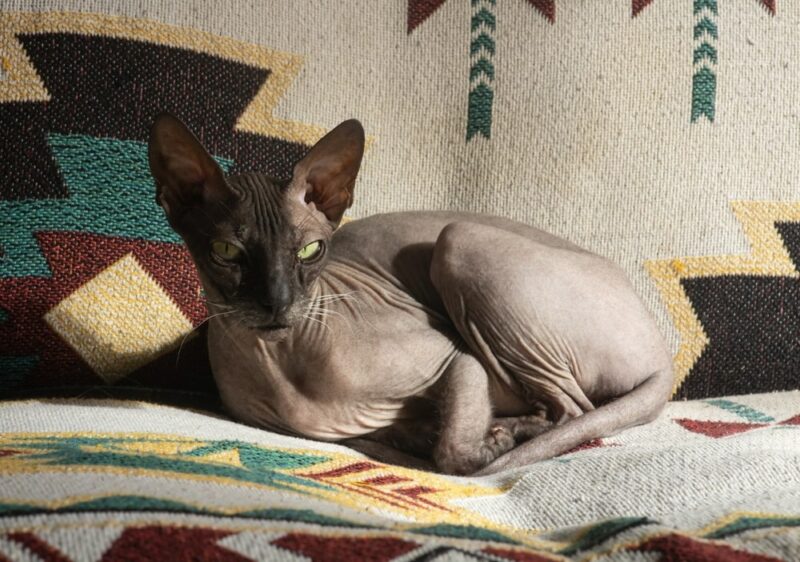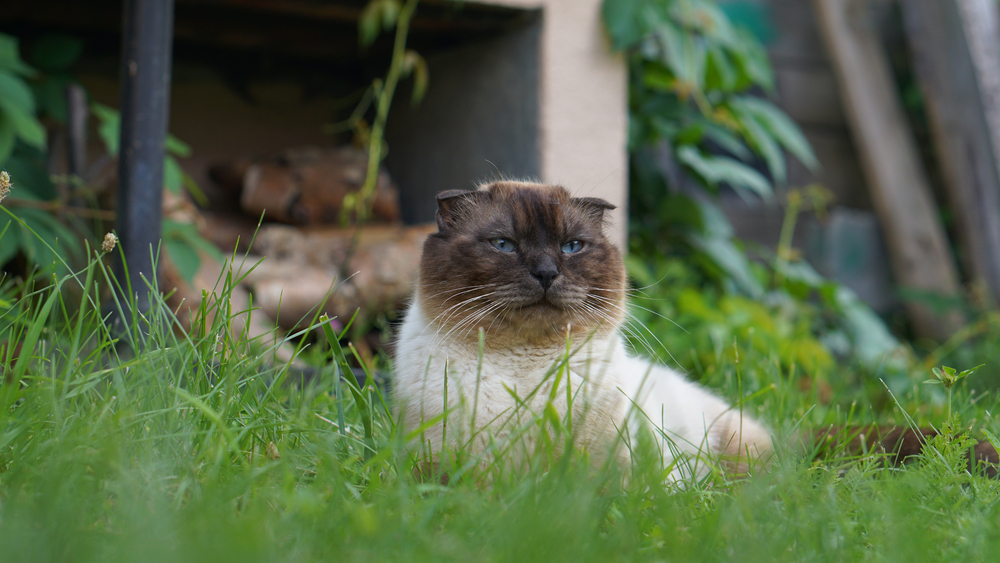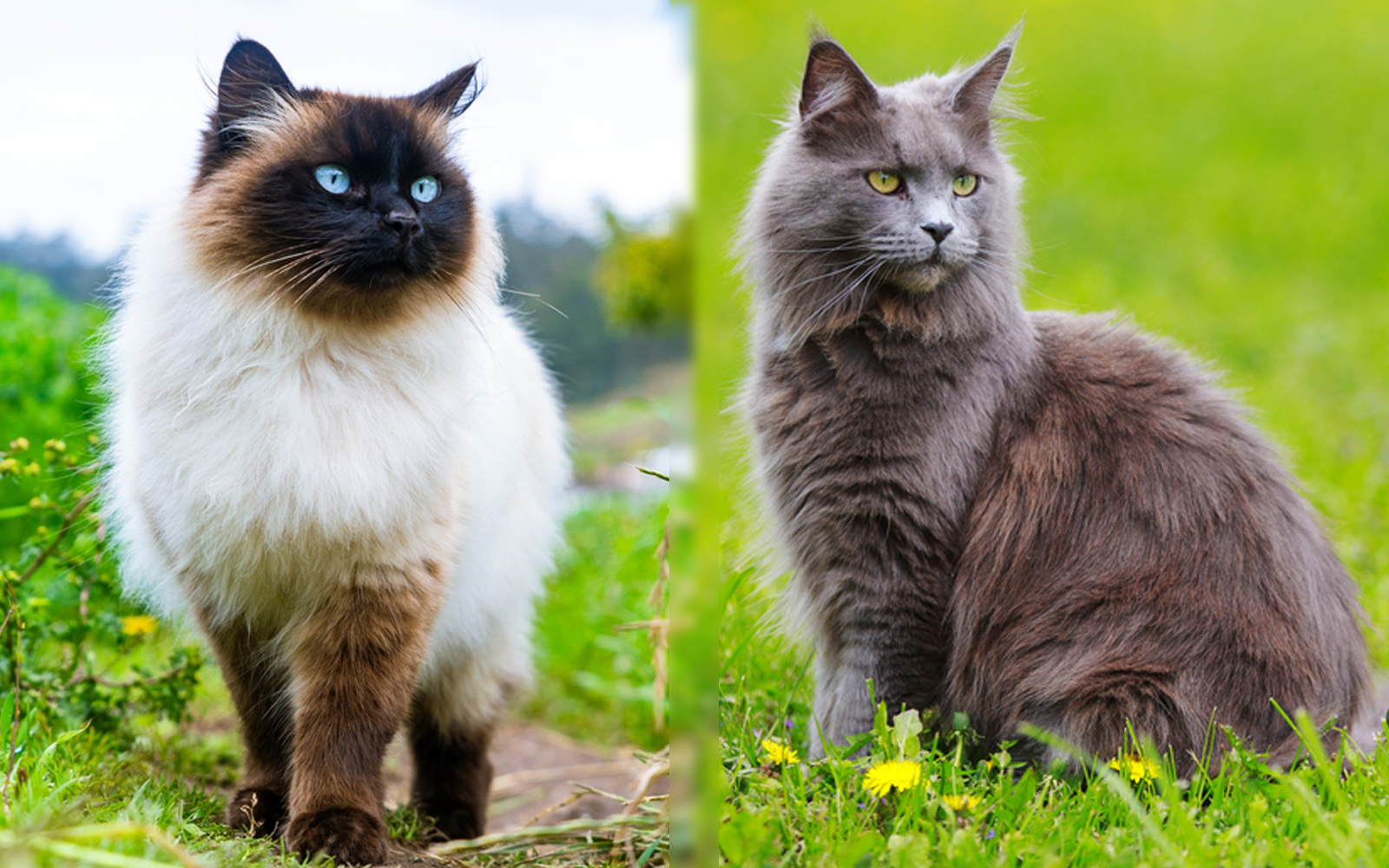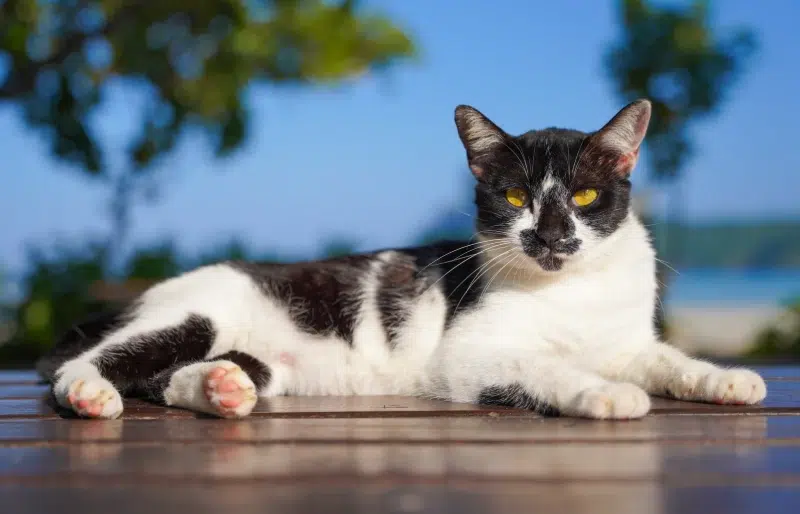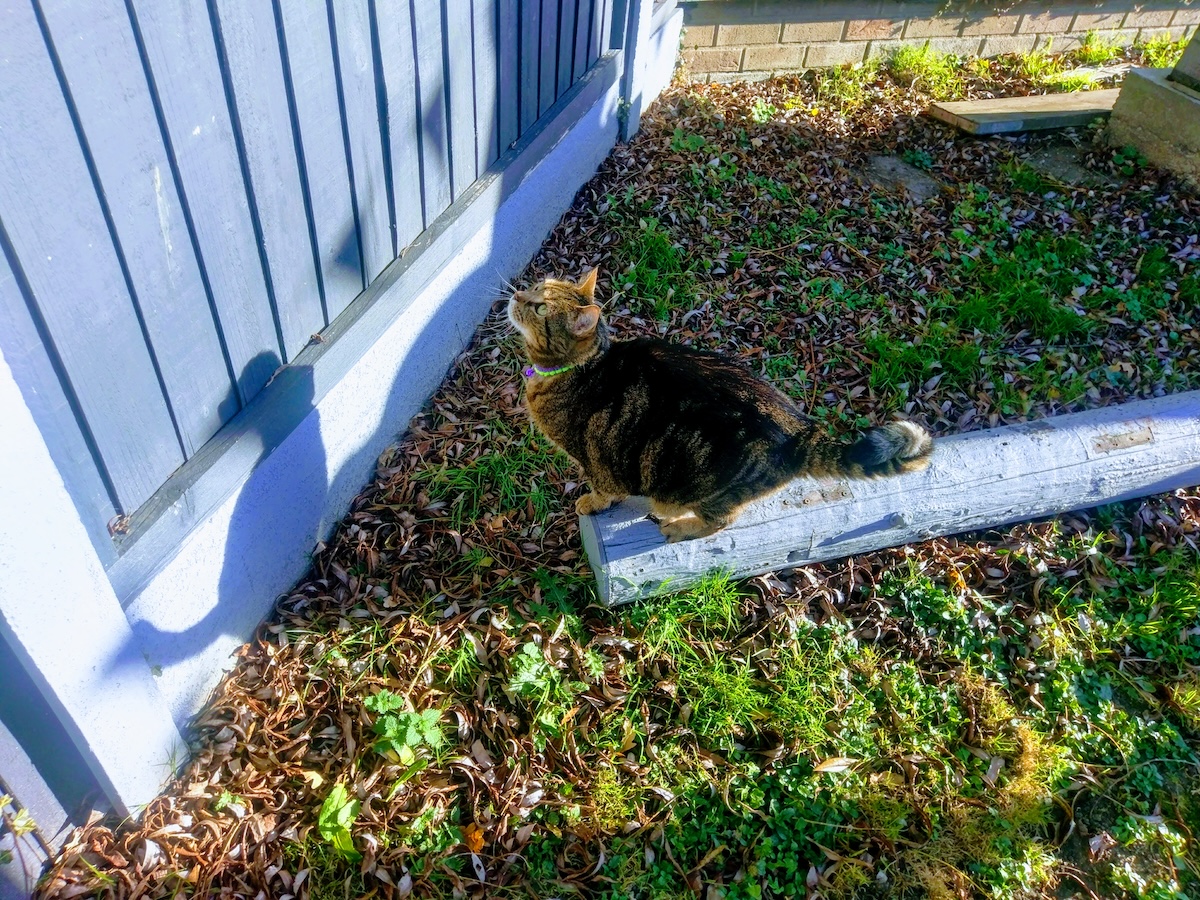If you’re a cat lover looking for a feline companion that’s charismatic and intelligent, the Donskoy breed might be the perfect fit for you. These unique and lovable creatures have a distinct appearance with their hairless bodies and wrinkled skin, but their personalities truly set them apart. Donskoys are known for their charming and social natures, making them great companions for individuals and families alike.
Breed Overview
Height:
11–12 inches
Weight:
6–14 pounds
Lifespan:
12–15 years
Colors:
White, blue, silver, red, brown, gray, black
Suitable for:
Active families, those looking for a low-shedding cat
Temperament:
Loyal and loving, intelligent, easy to train, friendly, gets along with other pets
The Donskoy cat breed (also known as a “Don Donskoy” or “Russian Hairless”) is known for their distinctive hairless appearance and charming personality. This feline beauty is a breed apart, with a unique set of characteristics that make them a popular choice among cat enthusiasts. Probably one of the most popular Donskoys in media was “Mr. Bigglesworth,” which portrayed the beloved pet of Dr. Evil in the popular Austin Powers movies. These no-hair cats definitely stand out and as a result, always have a fairly high price tag to those who seek them out.
Donskoy Cat Breed Breed Characteristics
Donskoy Cat Breed Kittens
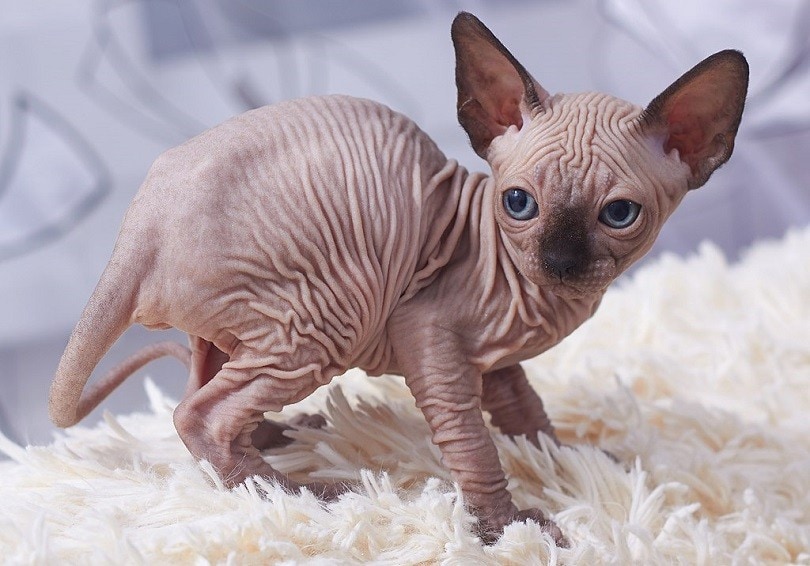
If you’re looking to buy a Donskoy, there are several options available to you. The first place to start your search is by contacting reputable breeders in your area. A breeder will be able to provide you with information about the breed, answer any questions you may have, and help you find the perfect Donskoy cat for your household. Another option is to search online for breeders who specialize in the Donskoy cat specifically.
In addition to breeders, animal shelters and rescue organizations may also have Donskoy cats available for adoption. Adopting a cat from a shelter or rescue is a great way to provide a loving home to an animal in need. However, it’s important to keep in mind that Donskoy cats are really a relatively rare breed (especially in the U.S.) and may not be readily available at all shelters, depending on where you live.
You may be able to find Donskoy cats for sale through online classifieds or pet stores. While these options may be more convenient, always exercise caution when purchasing a pet through these channels, make sure to research the seller or store carefully, and ensure that the animal has been properly cared for and socialized before bringing them into your home.
Temperament & Intelligence of the Donskoy Cat Breed
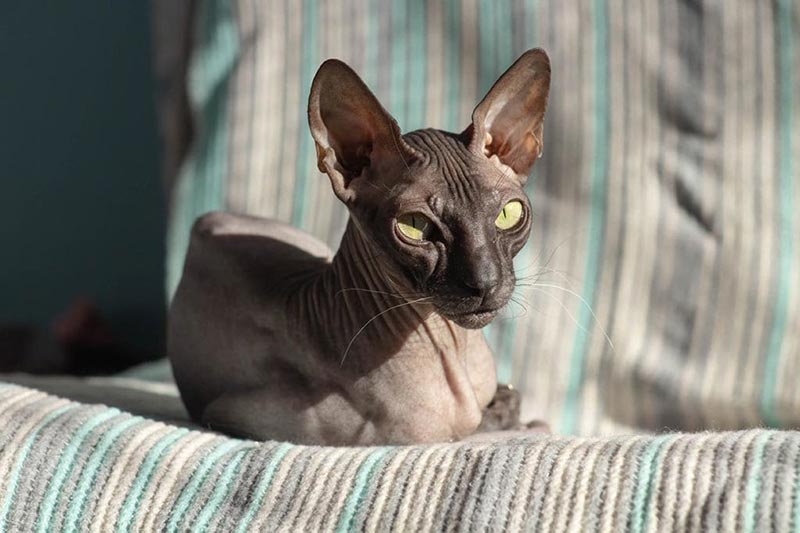
Are These Cats Good for Families?
The answer is yes, Donskoys can make great pets for families. One of the benefits of these cats is that they’re social and affectionate. They really love to be around people and will often follow their owners around the house. This makes them great companions for families who enjoy spending time with their pets. Donskoy cats also have a rather playful nature and enjoy playing with toys and interacting with their owners (consider using cat wands and lasers with these playful felines).
Another advantage of Donskoy cats is that they’re low-maintenance pets. Since they have no fur, there’s no need for regular grooming or shedding—probably one of the best benefits of owning these cats. This can be a relief for families who are allergic to cat hair or who don’t want to deal with the hassle of cleaning up shed fur in their home or on their clothes. However, it’s important to note that Donskoy cats still require special grooming care, particularly when it comes to their skin, which is prone to dryness and can be sensitive to sunburn.
Does This Breed Get Along With Other Pets?
Yes, these friendly cats tend to be pretty easy-going compared to most other cat breeds. Donskoy cats may get along well with dogs, rabbits, birds, and other cats if they’re introduced to each other in a proper way. It’s vital to introduce new pets gradually and carefully to avoid any confrontations or territorial issues. Supervision is also necessary during the initial introduction period to ensure that the new pets are getting along well with each other.
But it’s important to note that each cat has their own unique personality and temperament. Some Donskoy cats may be more tolerant of other pets, while others may prefer to be the only pet in the household. Owners should observe their cat’s behavior toward other animals by visiting the breeder or observing them in the shelter before deciding to introduce a new pet into the household.
Things to Know When Owning a Donskoy Cat Breed:
Food & Diet Requirements 
These cats actually require special attention when it comes to their diet and nutrition. They have a faster metabolism than other breeds, which means they require more calories to maintain their energy levels. So, it’s essential to feed them with high-quality food that is rich in protein and nutrients. They need plenty of protein on a daily basis because protein is essential for the growth and maintenance of their muscles and tissues. Lean meats such as chicken, turkey, and fish are excellent sources of protein that can help keep your Donskoy cat healthy and active.
Another important factor to consider when choosing cat food for Donskoy cats is the quality of the ingredients. High-quality cat food should contain natural ingredients that are free from artificial preservatives, flavors, and colors. It’s also crucial to avoid foods that contain fillers, such as wheat, corn, or soy, as these can be difficult for these cats to digest. Quality cat food brands, such as Blue Buffalo, Hills Science Diet, Royal Canin, and Purina One, are great options to consider.

Exercise
Overall, like any other cat breed, the exercise requirements for Donskoy cats can vary depending on their age, weight, and overall health, but there are some general guidelines that can help keep them in good shape. On a daily basis, anywhere from 20 to 40 minutes can be enough exercise for a healthy adult cat.
One of the best ways to provide exercise for your Donskoy cat is through play. They love toys that they can chase, pounce on, and play with. So, interactive toys, such as feather wands, DIY mazes, puzzles, or laser pointers, can be particularly effective in keeping these cats engaged and active.
In addition to playtime, Donskoy cats may benefit from regular walks or outdoor playtime in a secure enclosure, like a catio. However, it’s important to note that these cats are sensitive to temperature changes and may need to be protected from extreme heat or cold. You can encourage exercise by providing opportunities for climbing and jumping. Donskoy cats are natural climbers and enjoy perching on high surfaces, such as cat trees, cabinets, or shelves. Providing these types of structures in your home can give your cat a chance to exercise and explore their environment.
Training
Donskoy cats are known for their high energy levels and playfulness, so training them can be a bit more challenging than with other breeds. The first step in training a Donskoy cat is actually to establish a strong bond with them. Spend time playing with them and giving them plenty of attention. This will help them to trust you and make the training process much easier. Positive reinforcement is also key when it comes to training these cats.
So, reward them with treats or praise when they behave well or follow commands. These active cats can be trained to use a litter box, do simple tricks, and follow commands. However, it’s best to train them on one trick or command at a time. Probably one of the most convenient things to train them on would be the litter box. You can do this by placing the litter box in a visible location and encouraging them to use it regularly. When they do, be sure to reward them with treats or praise. Over time, you’ll find that the cat will learn to use it on their own. After that, consider moving on to obedience commands (like “come or “sit) or easy tricks.
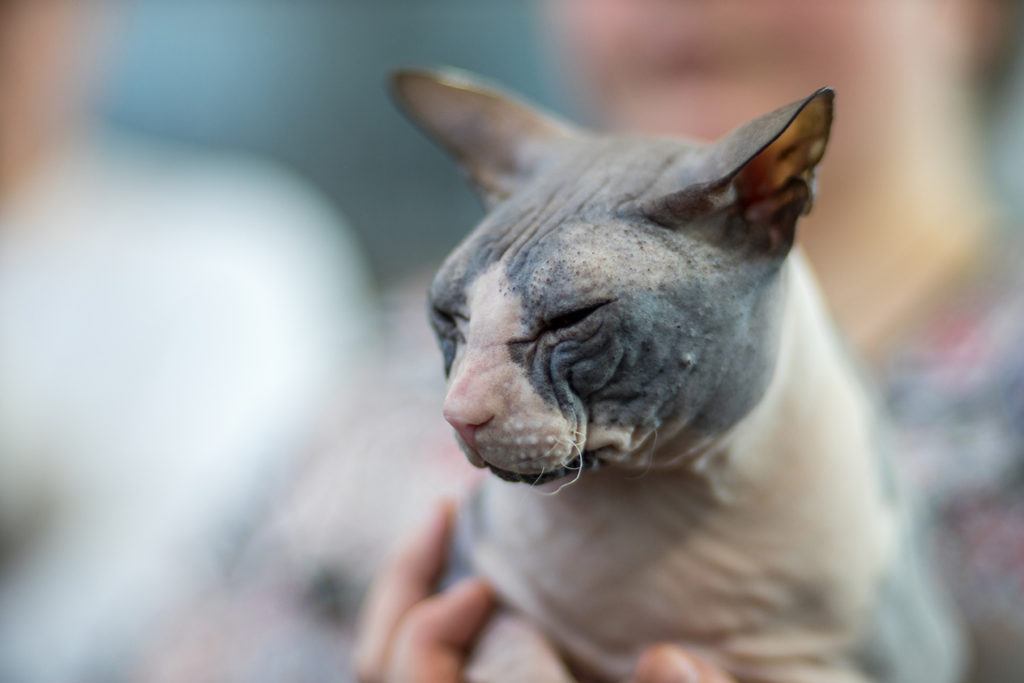
Grooming ✂️
Contrary to popular belief, these cats are not completely hairless, as they have a fine layer of fuzz on their skin. This fuzz can easily accumulate oil, dirt, and debris, making regular grooming essential.
Use the Right Shampoo When Bathing
These cats need bathing about every 1–2 weeks. Donskoys have sensitive skin that can easily become dry or irritated. So, when bathing them, it’s best to use products specifically designed for sensitive skin. Look for a gentle shampoo made for cats that is free of harsh chemicals and fragrances, like Kotomoda Probiotic Shampoo. It’s also important to use lukewarm water when bathing your cat, as hot water can further dry out their skin.
When bathing a Donskoy cat, owners should make sure to thoroughly wet their entire body and apply the shampoo gently in circular motions. It’s also best to ensure that all the shampoo and residue are rinsed off completely and to towel pat them dry. These cats can easily run into fungal issues if their skin is left moist for long periods of time.
Trim Their Nails
Donskoy cats also need to have their nails trimmed regularly. This is especially important for indoor cats, as their nails don’t really get naturally worn down by outdoor activities. You can use cat nail clippers to trim their nails or take them to a professional groomer. There are lots of videos on YouTube that you can also watch to see how to trim cats’ nails correctly.
Clean Their Ears
Another important aspect of Donskoy cat grooming is ear cleaning. These cats are prone to earwax buildup due to the lack of hair around their ears. The quickest and easiest way to clean their ears is to simply use a cotton ball dipped in a pet ear cleaning solution or to use it dry. Make sure to never insert anything into their ear canal, and only clean the visible parts of their ear. If you see anything oozing from their ear or notice any particularly foul orders, be sure to take your cat to the vet, as they may have an ear infection.
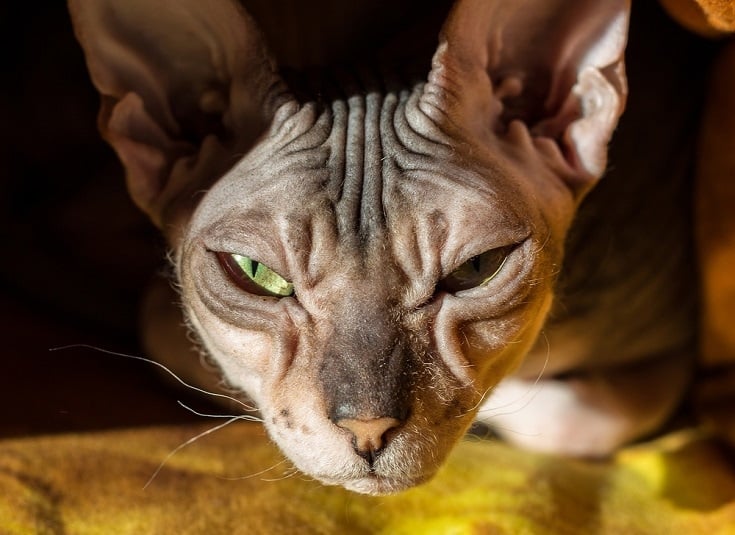
Keep Them Out of the Sun
These cats need to be protected from the sun, as they are vulnerable to sunburn and skin damage; after all, they have very little fur. You can use cat-safe sunscreen or provide them with a shaded area to play in. You’ll also want to keep them indoors during the hottest hours of the day.
Health and Conditions
- Allergies
- Dental issues
- Skin problems
- Heart disease
- Respiratory issues
- Asthma
- Upper respiratory infections (URIs)
Minor Conditions:
- Allergies: Donskoy cats are known to be a tad sensitive and are often prone to developing allergies, which can cause respiratory issues. Allergies in cats can be caused by a variety of factors, such as flea bites, certain foods, and outdoor allergens. Signs of allergies in cats include sneezing (or wheezing), coughing, itching, and skin irritation. If left untreated, allergies can actually lead to secondary infections and other health complications. Therefore, it’s essential for Donskoy cat owners to identify the cause of their pet’s allergies and take steps to manage them, such as changing their diet or using medications.
- Dental Issues: One of the most common minor health problems that Donskoy cats face is dental issues. They are prone to gum disease, which can lead to tooth decay and loss. So, it’s important to brush their teeth regularly and take them for dental check-ups to prevent these issues. You can also get them feline cat chews that are specially formulated to help reduce plaque and bacteria.
- Skin Problems: Skin issues are also common in Donskoy cats, due to their lack of fur. They’re prone to sunburn, which can lead to skin cancer. It’s important to keep them out of direct sunlight, especially during peak hours (like from noon to 5 p.m.). Also, they’re prone to developing skin infections and rashes, which can lead to discomfort and even infection. Regular, careful grooming and cleaning can help prevent these issues.
Serious Conditions:
- Heart Disease: One serious health issue that can affect Donskoy cats is heart disease. This breed is particularly susceptible to hypertrophic cardiomyopathy, a condition where the heart muscle thickens and becomes less effective at pumping blood. Regular check-ups with a vet can help catch this condition early and allow for proper treatment.
- Respiratory Issues: One of the lesser-known health issues that can affect Donskoy cats is respiratory problems. Due to their unique anatomy, they’re prone to developing respiratory infections and breathing difficulties. This can be exacerbated by exposure to cigarette smoke or other environmental irritants, like bad air quality.
- Asthma: One common respiratory issue that Donskoy cats experience is asthma. This is a chronic condition that causes inflammation in the airways, making it difficult for them to breathe. Signs of asthma in cats include coughing, wheezing, and difficulty breathing. If left untreated, asthma can lead to serious complications, such as respiratory failure. So, it’s essential for Donskoy cat owners to be aware of the signs of asthma and seek veterinary care if necessary.
- URIs: Other respiratory issues that Donskoy cats may develop are URIs. These are caused by a variety of viruses and bacteria and can lead to issues such as sneezing, coughing, runny nose, and fever. URIs are actually highly contagious and can be easily spread between cats (so note this if you have other pets at home). It’s crucial for Donskoy owners to keep their pet isolated from other cats if they suspect that they have a URI. Treatment usually involves antibiotics and supportive care, such as fluids and rest.
Male vs. Female
By just looking at them, you may be able to tell a male from a female Donskoy. In terms of size, male Donskoy cats tend to be larger than females, with an average weight of 8 to 12 pounds compared to females that typically weigh between 6 to 8 pounds. This difference is due to the fact that males are generally more muscular and have a larger bone structure than females.
Another notable difference between male and female Donskoy cats is their behavior. Male Donskoy cats are often more affectionate and outgoing than females, which tend to be more reserved and independent. This may be due to hormonal differences, as males have higher levels of testosterone, which can influence behavior. However, every cat is unique, and there can be exceptions to these generalizations.
When it comes to grooming, both male and female Donskoy cats require regular maintenance despite their lack of fur. However, there are some differences in grooming depending on the cat’s sex. Female Donskoy cats may require additional cleaning around their genital area during heat cycles or after giving birth. Male Donskoy cats may develop a build-up of smegma around their penis if not cleaned regularly. This can lead to irritation and infection if left unaddressed.
3 Little-Known Facts About the Donskoy Cat Breed
1. The Donskoy cat breed is not actually completely hairless.
This cat actually has a fine layer of downy hair covering their body, which can be seen and felt when you stroke them. This layer of hair helps regulate the cat’s body temperature and protects their skin from scratches and bruises.
Donskoy cats enjoy being held and cuddled and will often seek out human attention when they want it. They have tons of energy and are great for homes with children or active adults.
3. The first Donskoy cats were born in Toronto, Canada, in the 1960s.
They actually came to be when a hairless kitten was discovered in a litter of domestic shorthairs. This kitten was bred with other cats to create the first Donskoy cat. The breed quickly gained popularity and spread to other countries, including the U.S. and Europe.
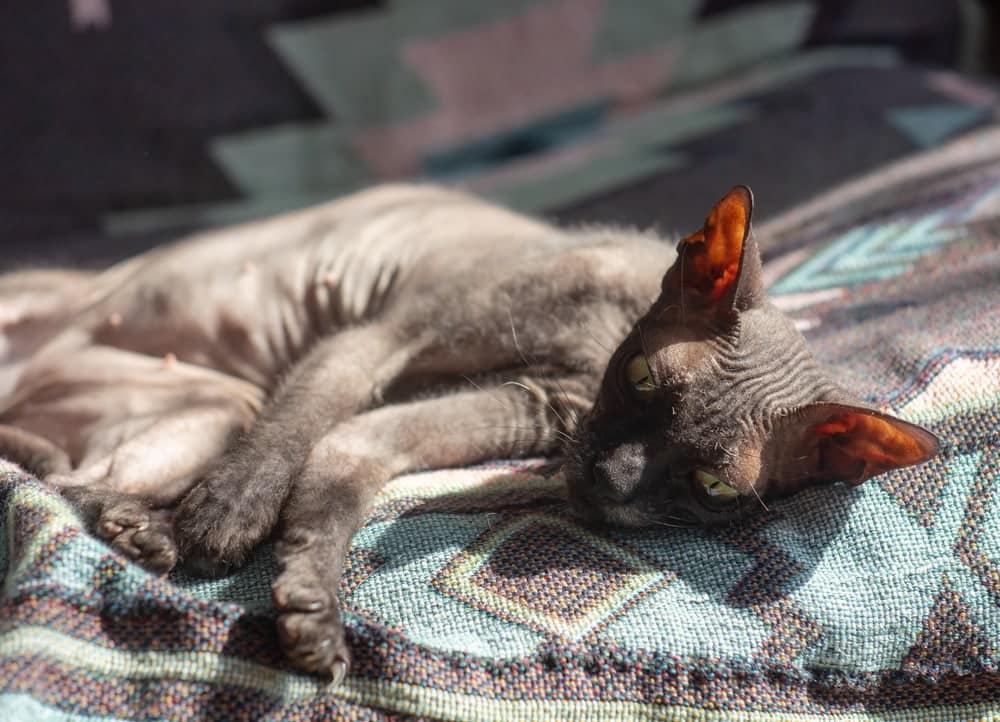

Final Thoughts
If you’re considering getting a Donskoy cat, there are a few things you should keep in mind before making the decision. First, Donskoy cats are known for their unique appearance. They’re hairless (sort of) and have wrinkled skin, which some people find endearing and others find strange. So, don’t be surprised if not everyone you come across shares your love and appreciation for this interesting breed.
Second, these cats require a lot of attention and care. They need regular baths to keep their skin clean and free of oils, which can cause acne and other skin issues. They also need to be kept warm, as they do not have fur to regulate their body temperature. However, despite these challenges, many people find Donskoy cats to be wonderful pets. They are intelligent, playful, and affectionate, and they often enjoy snuggling and bonding closely with their owners, which can make owning them very rewarding.
- You might also be interested in: Rarest Patterns and Coat Colors for Cats
Featured Image Credit: Viachaslau Herostratos, Shutterstock
Contents
- Donskoy Cat Breed Breed Characteristics
- Donskoy Cat Breed Kittens
- Temperament & Intelligence of the Donskoy Cat Breed
- Things to Know When Owning a Donskoy Cat Breed:
- Food & Diet Requirements
- Exercise
- Training
- Grooming ✂️
- Health and Conditions
- Minor Conditions:
- Serious Conditions:
- Male vs. Female
- 3 Little-Known Facts About the Donskoy Cat Breed
- 1. The Donskoy cat breed is not actually completely hairless.
- 2. They’re known for being very social and affectionate.
- 3. The first Donskoy cats were born in Toronto, Canada, in the 1960s.
- Final Thoughts

